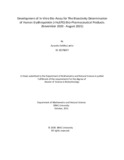Development of in-vitro bio-assay for The bioactivity determination of human Erythropoietin (rHuEPO) bio-pharmaceutical products (November 2020 - August 2021)

View/Open
Date
2021-10Publisher
Brac UniversityAuthor
Lamia, Ayeasha SiddikaMetadata
Show full item recordAbstract
Erythropoietin is mainly secreted by the kidney and involved in the growth and maturation of
erythroid cells from precursors (Jelkmann, et al, 2013). Insufficient production of EPO could
result in anemia. Considering this, recombinant human erythropoietin (rHuEPO) was profoundly
generated in 1980s. Therefore, it has been clinically approved in the treatment of anemia caused
by chronic kidney disease, blood loss anemia, and myelodysplasia induced by
chemoradiotherapy of cancer as the first hematopoietic growth factor (Moore, et al. 2011). Thus,
the quality control process and accurate determination of bioactivity is pivotal for the safety and
efficacy of rHuEPO. Since, in-vivo bioassay, based on rHuEPO-induced increases in swiss
albino mice reticulocyte count is the only method accepted by pharmacopoeias which is
complex, expensive and time consuming.
This proliferating bioassay will utilize a sub clone of TF-1 cell line. TF-1 cell line proliferates in
the presence of GMCSF and IL-3. Active erythropoietin will induce the dose-response curve
might show good linearity, yielding a coefficient of determination of 0.99 or higher.
This new in-vitro bio-assay is simpler, faster and viable substitution of in-vivo reticulocyte assay
and employed in potency determination of rHuEPO bio-pharmaceutical products.
